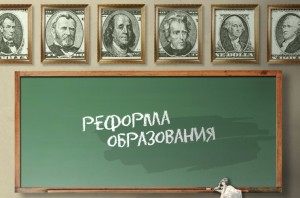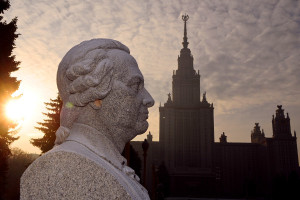
The population’s educational attainment is commonly considered as a key indicator of the country’s investment attractiveness. When in the early 1990s, Russia opened its domestic market for foreign investment, its population’s universal literacy and a considerably higher percentage of college-educated specialists than in other BRICS countries, that is in China, India, Brazil and South Africa, was seen as an important competitive advantage.
Unfortunately, Putin came to power at the exact moment when the country’s protective layer of quality education, that had been built over the previous years and was worn down considerably by a drastic transition to a market economy, demanded government attention financing and reform. Although prior to 2000 corruption had already blossomed in Russian universities, the country’s secondary and higher education system has been completely destroyed over the following 16 years. It was replaced by a new system, built under the national leader’s supervision, in which graduates’ actual level of knowledge does not matter since it is much more important for government employees to know how to please their superiors and how to take and give bribes.
Today, corruption calls the shots in science and education. Thus, according to the Dissernet project, plagiarism in dissertations of Russian officials has become a mass phenomenon affecting all three branches of power: extensive copying of sections of text from a source without quotation marks or proper citation has been found in dissertations belonging to Duma Speaker Sergei Naryshkin, Interior Minister Kolokoltsev and Director of the Federal Drug Control Service Ivanov, children’s rights ombudsman Astakhov, Moscow Mayor Sobyanin, Deputy Chairman of the Russian Supreme Court Sviridenko and even President Putin. Russian officials themselves do not seem particularly concerned by Dissernet exposures. At worst, the authenticity of the research will be subject to a verification by the Dissertation Council that will find no traces of plagiarism in the submitted paper, as it happened in Sviridenko’s case.
On the other hand, truly talented students do not see any point in preparing theses and Ph.D. dissertations not only due to the fact that an overwhelming number of today’s research works are either purchased or copied but also because corruption in Russia’s education system makes it practically impossible to defend a scientific paper without paying a bribe. Considering that even in Russia’s (formally) free education system students have to unofficially pay their professors, not many can afford additional expenses that a dissertation will entail.
Another reason of the erosion of Russian education is that family connections and social affiliations are much more valuable in procuring a cushy job than one’s actual level of knowledge and competency. As with plagiarism in dissertations of Russian officials, the fish rots from the head down. Thus, Putin’s son-in-law Kirill Shamalov has turned into a billionaire business oligarch in a fantastically short period of time, and sons of Russia’s Security Council Secretary Nikolai Patrushev, Andrei and Dmitri, both of whom are not even 30 yet, were appointed advisor to the head of Rosneft and vice-president of Vneshtorgbank (VTB). The most recent example is the , responsible for overseeing Russia’s military-industrial complex, Alexei Rogozin, who at the age of 32 was appointed deputy director of the Department of property of Russia’s Defense Ministry, the position formerly occupied by the mistress of former Defense Minister Serdyukov.
In this context the Russian government must see the task of preserving Russia’s educational and scientific potential as rather unnecessary if not detrimental to the current regime. Today, Russian scientists spend most of their time trying to secure financing and fighting to preserve the existing scientific background knowledge. Russia’s top academic institution, the Lomonosov Moscow State University was ranked 161st in the Times Higher Education (THE) World University Rankings, and this is the best result among Russian universities. The Nature Publishing Group ranked the Russian Academy of Sciences (RAS) 193rd out of 200 in its rating of academic journals. RAS representatives immediately dismissed the ranking as biased. However, even RAS President Vladimir Fortov admits that Russia is falling significantly behind in the scientific sphere.

What Russia will lose with the collapse of science and education is obvious. Kremlin “scientists” clearly have no intention to change anything since any change should start in the Kremlin itself, and the regime is obviously not prepared for that. Kremlin officials are neither ready to stop distributing plum jobs among their friends and family members or willing to admit to plagiarism and purchasing doctorate degrees. But the most important reason for them to avoid investing in science and education is that they certainly do not want to contribute to raising the Russian population’s level of intelligence. An educated population capable of critical thinking would be seen as a threat by the current Russian regime.





